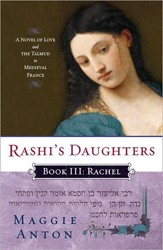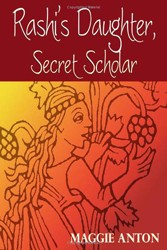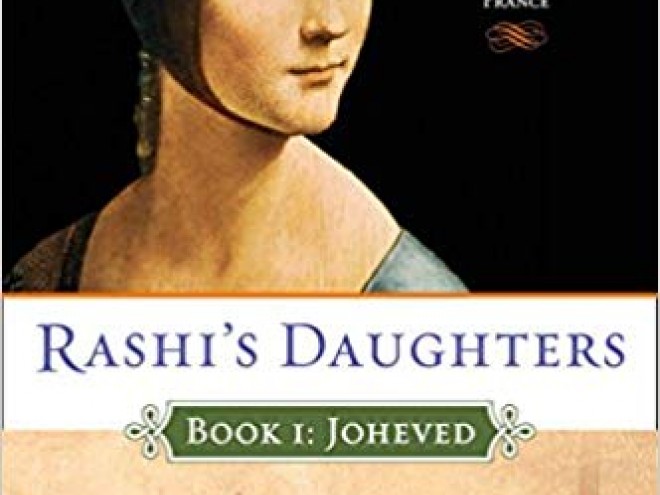Maggie Anton’s highly original and carefully researched book, Rashi’s Daughters, is a compelling fictional account of the life of one of the great Talmudic scholars, Rabbi Shlomo Yizhaki, also known as Rashi. Born in France in 1040, C.E., Rashi, a winemaker by trade, operated a renowned school where students flocked from near and far to learn the Talmud from him. Rashi had no sons, but three daughters, Joheved, Miriam and Rachael, who displayed a keen intellect, and a thirst for learning the Talmud. In those times, it was unheard of for a teacher to instruct a woman in Talmudic law, whose study was limited to male yeshiva students. Rashi was a renowned scholar, his talents going to waste when he found himself without any students during a period of his life. On the day his wife Rifka was giving birth to her third child, Rashi’s daughter Joheved came to him with a question about Rifka’s birth which was best answered with a sacred passage from the Talmud. Although not technically forbidden, women did not study in yeshivas, were often illiterate and did not study the Talmud. Nevertheless, after introspection and study, Rashi found the Talmud itself mentioned learned women, often the daughters of scholars. From that day on, Rashi’s daughters, particularly Joheved, became some of his most adored students and their love affair with these sacred texts began to blossom.
Rashi’s Daughters is beautifully written, and often, with her detailed and piercing use of language, the reader feels as if he or she is learning the words from these sacred texts, in the company of the master, Rashi himself. Ms. Anton, who herself studied Talmud for ten years, took seven years to write Rashi’s Daughters, a book in which fastidious research and well-crafted writing are interwoven.
Barbara S. Cohen is a trial attorney in Los Angeles who specializes in child abuse cases. She is a member of NAMI and a supporter of NARSAD, and is an advocate for those who suffer from mental illness.
Discussion Questions
Courtesy of Penguin
1. What tone does the opening scene set? What does it tell you about Joheved’s character?
2. Describe how the bond between Joheved and Salomon develops and changes with time? Discuss the pros and cons of Jewish childhood in medieval France.
3. Rashi’s Daughters is filled with carefully researched historical anecdotes that the author uses as inspiration for her own imagined scenes. Discuss this interplay of fact and fiction.
4. Rivka is upset with her daughters learning Talmud. Are her objections reasonable? Why would men not want women in a position of knowledge? What is threatening about educated women? Discuss the role of women in medieval society versus their role today.
5. Joheved and Meir have an arranged marriage, as do Salomon and Rivka. Compare Joheved and Meir’s relationship to Salomon and Rivka’s? To Miriam and Benjamin’s? Discuss the pros and cons of arranged marriage versus marrying for love. Why would Sarah prefer widowhood to remarriage?
6. Salomon’s decision to write down his kuntres is a controversial innovation. Discuss how a society is changed in a shift from oral to written tradition.
7. Relations between French Jews and Christians were fairly tolerant during this time. Was this lack of overt anti-Semitism surprising? What other myths about medieval times did Rashi’s Daughters debunk?
8. Which characters resonated the most powerfully for you? Were there others you would have liked to have known more about? Why?
9. What do you see in the future for Rachel? Are there any clues that indicate what might happen?
10. Religion was a powerful force for both Jews and Christians in medieval times. Is religion as powerful now? How does your religion, or lack of one, influence your life?





